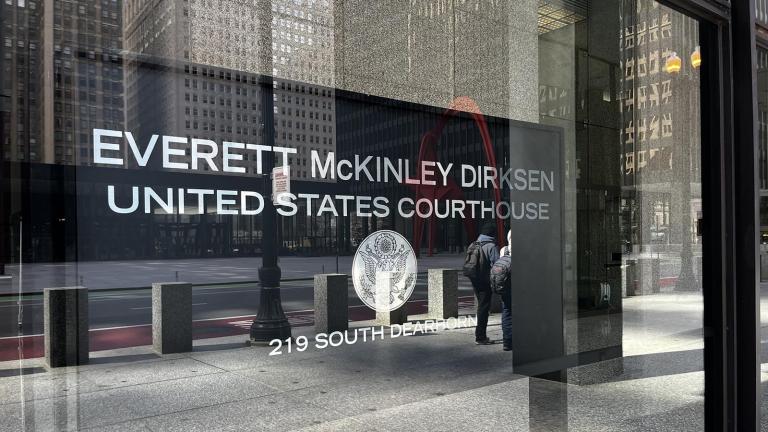Freshman state Rep. Terra Costa Howard says was already frustrated by House Speaker Michael Madigan’s leadership even before July, when he was identified in federal court documents as the intended target of a long-running bribery scheme with Commonwealth Edison.
She says she felt he wasn’t doing enough to lead Illinois through the coronavirus crisis. “I wasn’t elected to sit on the sidelines and do nothing. I mean, people were dying. There were things that needed to happen and nothing was moving,” Costa Howard said.
Madigan has issued a statement steadfastly denying any involvement or wrongdoing, and Costa Howard said as a former public defender, she believes in the principle of innocent until proven guilty.
Still, after some soul searching, she decided she could no longer support him.
By the end of July, she released a statement calling on Madigan to resign as speaker.
“Even if he was not directly involved in this scheme, these accusations clearly demonstrate that the Speaker’s leadership has failed,” the statement reads. “Speaker Madigan has a duty to recognize that these allegations have cast a deep shadow on the reputation of our House. He must take action now to avoid inflicting further damage on the members of the House and the Democratic Party.”
With that, Costa Howard became the first Democrat to publicly denounce and defect from Madigan.
Costa Howard told WTTW News this week that she believes she was penalized for it.
“Let me tell you the impact was much greater than people realize, particularly because this occurred in the middle of my (November general election) campaign” against former Republican state Rep. Peter Breen, she said. “It had huge ramifications for me when I decided that I needed to … speak out.”
Ramifications, she said, that included getting cut off from traditional large Democratic donors for fundraising and being sent a novice campaign worker from the Democratic Party of Illinois versus a seasoned staffer.
She said DPI, which Madigan also controls, didn’t have conversations with her about these changes.
And she said DPI slow-walked polling in her district and a refusal by the party to allow her to ask a poll question about Madigan.
“It’s a very fine line, right? Because you don’t want anything to look retaliatory,” she said.
She said she ended up doing her own poll, outside of DPI.
It showed that Madigan was less popular in her west suburban district than President Donald Trump.
Costa Howard said she did not take money directly from Madigan, though as a Democrat she did accept funding from Democratic committees under his auspices.
A DPI representative for Madigan said that a half-million dollars was spent on Costa Howard’s race, and that no changes were made as a result of her speaking out.
Rather, the spokeswoman said, resources were diverted to more competitive races after it became clear that Costa Howard was pulling ahead against Breen.
“Polling drives everything so most decisions are made on that,” the DPI spokeswoman said.
But there are other ways for a powerful legislative leader to exact punishment, and Costa Howard said that’s why it’s so significant when a sitting Democrat revolts.
“It is a big deal and I don’t think people really understand — outside of those of us who are living it every day — what it’s like to come out and say ‘I will not be supporting him,’” she said. “As a legislator we have a responsibility to pass legislation that hopefully benefits our districts, and legislation could be held up. It could be something that you’ve worked on and it’s important. It could mean what committee assignments. It could mean projects that come out to your district. It impacts not just you personally but it impacts your district.”
While Costa Howard was the first House Democrat who’d supported Madigan in the past to defect, Rep. Anne Stava-Murray, D-Naperville, refused to vote for him for speaker in 2018.
Even so, Stava-Murray was able to have a freshman term in Springfield, passing seven bills.
“I think it was really impactful to my colleagues to see that it’s OK,” she said.
Stava-Murray said she suspects she wasn’t blocked because Madigan’s former chief of staff Tim Mapes had been pushed out on the heels of a #MeToo sexual harassment and bullying scandal.
“From what I understand he would have been the ringleader in quote-unquote ‘making life a living hell’ for me,” she said. “So I think Tim Mapes not being there was critically important for me. I think the nature of my complaint being an ethical choice to note vote for (Madigan) because of the #MeToo era, incidents that had occurred in Springfield … I don’t think the other women in the caucus would have looked very fondly upon him very openly having retribution against someone who was standing up against that.”
Still, Stava-Murray said for nearly two years she has made weekly requests to meet with Madigan and he has ignored them.
Women will outnumber men in the House Democratic caucus once the new General Assembly is inaugurated in mid-January.
Stava-Murray said that’s something that Democrats should keep in mind as they decide who will be the next speaker.
“Why shouldn’t there be a potential female speaker of our House?” Stava-Murray asked.
Follow Amanda Vinicky on Twitter: @AmandaVinicky








